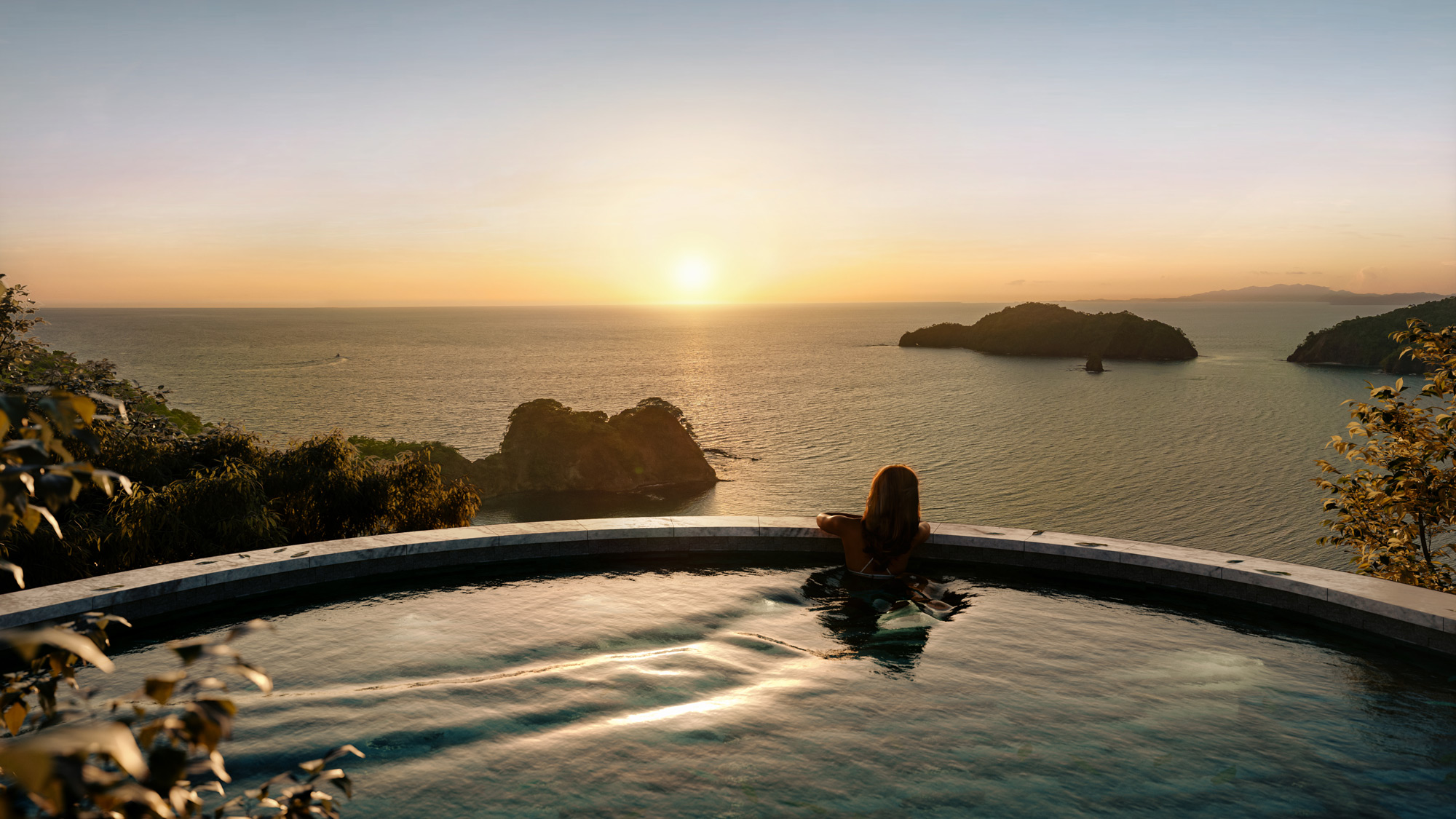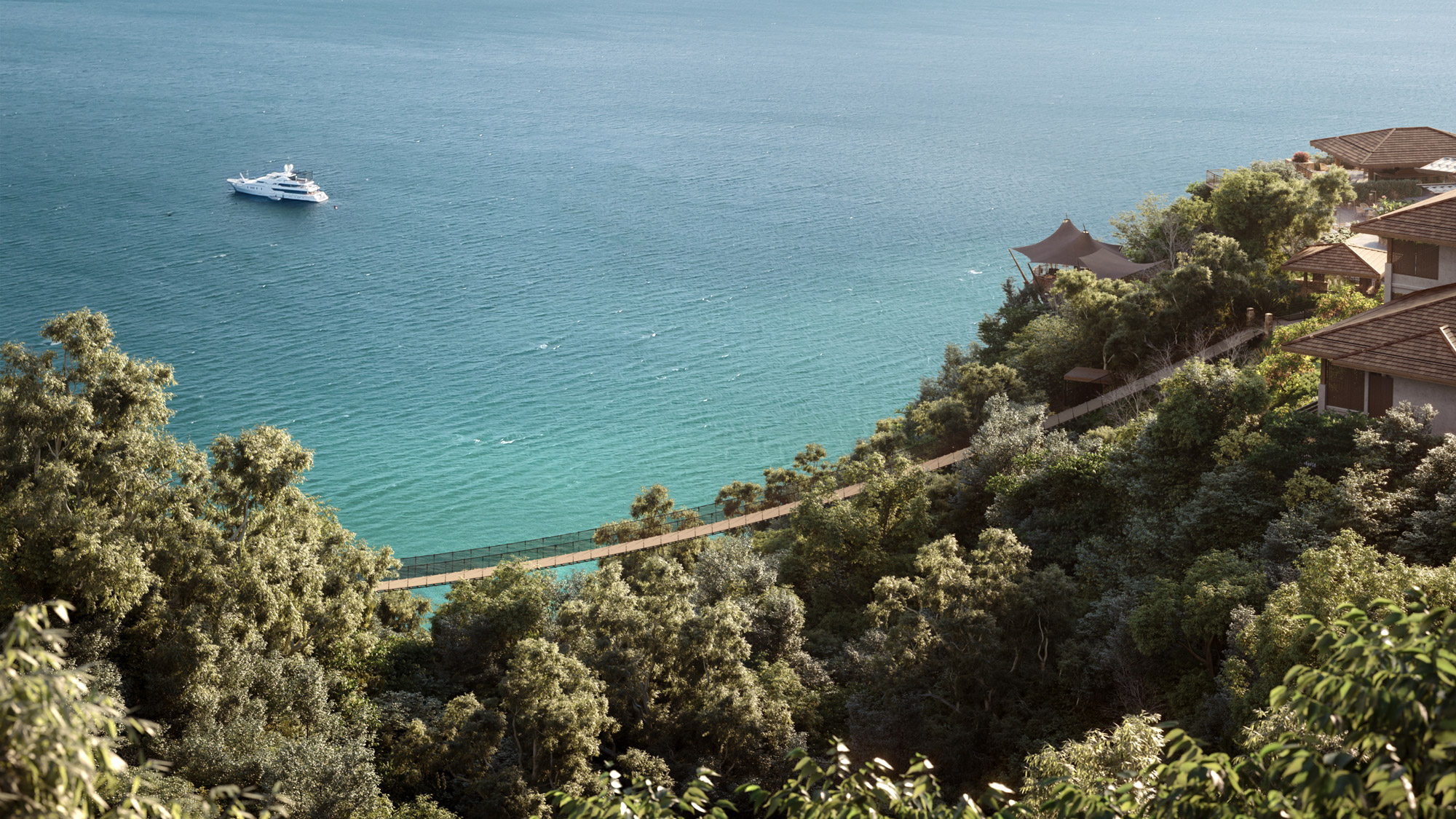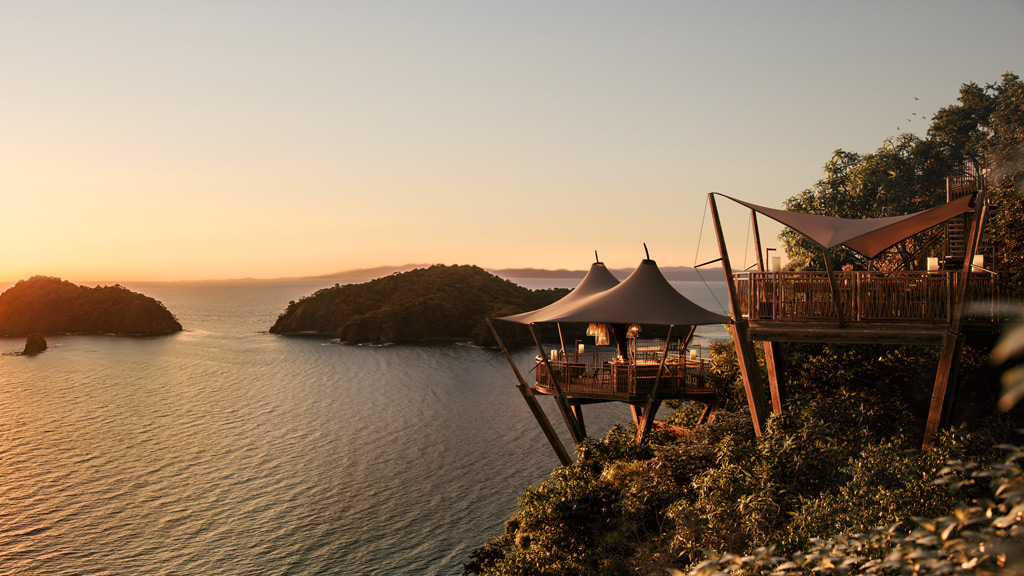What’s Next for Hospitality and New Luxury in Latin America
¿Qué sigue para la hotelería y el nuevo lujo en América Latina?
May 16, 2023 | By David Darlington
16 de mayo de 2023 | Por David Darlington
Guest Expectations, Industry Trends, and Opportunity
While the pandemic imposed great stress on the travel industry in general, it also stimulated a transformation in the hospitality sector that continues to push the boundaries of traveler expectations and desires. As a region steeped in culture, history, and beauty, Latin America’s characteristics are proving a natural fit in adapting to a more meaningful guest experience and a tourist’s tropical dream come true.
Today’s travelers are looking for quality over quantity, allowing for purposeful connections with friends and family, as well as immersive encounters with the local culture, people, and environment. They want an experience that challenges the norm, harmonizes their senses, and provides an affair in which they feel like they are impacting the narrative in some way. As a result, hotels and resorts in the region are increasingly focused on delivering experiences that go beyond the traditional definition of luxury.
New Luxury, Less Bling
While some still seek marble bathrooms and opulent furniture, there is a growing trend toward prioritizing relationships and connections over an outdated perception of luxury. As leisure and lifestyle drive travel investment decisions, developers and brands are being challenged to think beyond the standardized offering of generic design and experiences that could be found in any hotel or resort around the world.
Hotels in the region are looking to evolve to meet these new expectations by offering experiences that are unique to their specific location and engage with surroundings through outdoor living and a property journey that incorporates nature.
Celebrating the cultural imprint that may drive the local community creates opportunities for guests to interact with locals, learn from them, and build relationships that go beyond the customary guest-host relationship. These activities may be designed into the program or be a result of geographical location. Some recent resort integrations include surfing, biking, hiking, showcasing local artwork, offering cooking classes featuring traditional cuisine, or partnering with local tour operators to offer guests a chance to explore the region’s natural beauty through branded excursions.
In the Latin American hospitality industry, one noticeable modification is a shift away from traditional luxury amenities. Especially in a post-pandemic era, wellness looks to become more than an occasional spa visit, a necessity towards a fulfilled lifestyle. An opportunity for brands to integrate food, exercise, mental health, and routine into a holistic wellness package that guests can take home may lead to stronger brand loyalty while contributing to a positive human impact beyond property boundaries.

Blurring the Lines Between Traditional Hospitality and Living
Just as we see a push toward slower and more deliberate travel, the way in which travelers incorporate their work lives and family travel is also modifying. As a result, developers and brands are adapting to meet the needs for this growing population, one that is looking for more space and the ability to plug in for longer periods of time in a larger, residential style apartment rather than a traditional hotel room.
The evolution of workplace requirements and remote working has been a game-changer for many people, allowing them to work from anywhere with an internet connection has opened new opportunities for those looking to combine work and travel. Latin America is an attractive destination for remote workers, with its warm climate, beautiful beaches, and affordable cost of living. Many hotels and resorts are now catering to this market by offering coworking spaces and high-speed internet connections.
The rise of the digital nomad has also contributed to this hybrid hospitality model. Digital nomads are individuals who use technology to work remotely while traveling the world. They often stay in one place for several months or even years, making them ideal long-term guests for hotels and resorts. Some developers are now building properties specifically designed for digital nomads, with features such as shared workspaces, high-speed internet, and flexible rental agreements. Many governments are also joining the trend promoting the digital nomad model through tax breaks as it brings much needed local investment.
Extended family travel for leisure is also on the rise. Guests are looking for communal celebratory experiences, with common spaces to be together and ample private areas for distance when necessary.
Traditional hotels and resorts will need to adapt to cater to this demand for flexibility. Developers and brands must be creative to stay competitive in this changing landscape, and those who can successfully create properties that accommodate these new markets will be well-positioned for success.

Branded Residences
Even with continued inflation and the risk of pending recession and war, the Latin America branded residential market remains extremely active in recent years. The region has long been a popular destination for those seeking a second home; however, the pandemic has highlighted the importance of having a safe haven away from the chaos of the world.
Investment in Latin America has traditionally focused on commercial real estate, such as office buildings and shopping centers. However, the changing landscape has created new investment opportunities in the second home sector. These properties offer the potential for higher returns than traditional commercial real estate investments, especially when operated under an established brand.
In many cases, this new wave of buyers is younger, with new sources of wealth, and are not interested in the traditional idea of a resort or vacation home. Instead, they are looking for something fresh and innovative that meets their needs and expectations by offering high-quality finishes, modern technology, exceptional service, eco-friendly design, and wellness-focused amenities.
Following the trend, new resorts in the current market almost always include a residential element, and existing developments are looking to add to their current inventory or introduce homes for sale for the first time. Buyers are interested in investing on property that they can use for themselves, while also generating income through rental programs all linked to amenities and services of a hotel.

Sustainability and ESG Focus
The hospitality industry in Latin America has also seen a growing focus on sustainability and ESG (Environmental, Social, and Governance) strategies in recent years. Today’s travelers are increasingly concerned about the impact that their travel has on the environment and local communities, and hotels and resorts in the region are responding to this demand.
While the concepts of real change through impact investing have progressed slower than desired, the expectation is that as successful models show the economic, environmental, and social benefits, momentum will increase. Developers, brands, and lenders are taking notice of travelers’ openness to purposeful spending and experiences that give back in meaningful ways. These parties are also understanding that there should be an emphasis on reducing the cause of emissions — not just offsetting through third parties.
One important aspect of this shift towards sustainability is the adoption of resilient design strategies and technology. This involves incorporating features such as energy-efficient lighting, water conservation systems, responsible waste management, and eco-friendly building materials into hospitality projects. By doing so, hospitality providers are not only reducing their environmental impact but also creating more sustainable business models that can withstand the challenges of climate change and other environmental threats.
Many hospitality providers are taking a holistic look at their community engagement through a human lens by providing training, opportunities, and a living wage and by placing a special focus on inclusion in their workforce. Others are partnering with local artisans and farmers to offer authentic cultural experiences that benefit the local economy.
These moves towards a stronger sustainability and social responsibility focus in the Latin American hospitality market is a positive development for both the industry and the region as a whole. By embracing more sustainable and socially responsible practices, hospitality providers are not only meeting the evolving needs of their guests but also contributing to a more resilient and sustainable future for the region.
The Future of Latin American Hospitality
As the world continues to change, so do our needs, wants, and values. If we have learned anything in the last years, it is that well-being, the need for human connection, and celebrating the moment must be prioritized.
Overall, these trends suggest that the hospitality industry in Latin America is evolving to meet the changing needs and preferences of modern travelers, who are seeking more authentic, sustainable, innovative, and life enriching experiences when they travel. As a result, Latin American developers and designers who can adapt to these changing demands are likely to thrive in the years to come while contributing to the long-term well-being of the communities in which they operate.
For media inquiries, email .
Expectativas de los clientes, tendencias, y oportunidades del sector
A medida que los constantes cambios y adaptaciones que hemos visto en los últimos años, producto a la crisis humanitaria del COVID, el sector de hotelería sigue expandiendo los límites para atender las expectativas y deseos de los viajeros.
Como región arraigada en la cultura, historia y belleza, las características de América Latina están demostrando que encajan de forma natural a la hora de adaptarse a una experiencia más significativa para el huésped y materializar la idea de conectarse con el paisaje y la cultura de un turista.
Los viajeros de hoy en día buscan calidad en lugar de cantidad, lo que permite fomentar una conexión intencional con amigos y familiares, así como encuentros de inmersión cultural, la comunidad, y el entorno local. Buscan una experiencia que desafíe la norma, armonice sus sentidos y les proporcione una vivencia en la que sientan que están influyendo de algún modo en la historia del sitio. Como resultado, los hoteles y complejos turísticos de la región se centran cada vez más en ofrecer experiencias que vayan más allá de la definición tradicional de lujo.
Nuevo lujo, menos brillo
Aunque algunos siguen buscando baños de mármol y muebles opulentos, existe una tendencia creciente a dar prioridad a las relaciones y los vínculos por encima de una percepción anticuada del lujo. A medida que el ocio y el estilo de vida impulsan las decisiones de inversión en viajes, los desarrolladores y las marcas se enfrentan al reto de pensar más allá de la oferta estandarizada de diseño y experiencias genéricas que pueden encontrarse en cualquier hotel o complejo turístico del mundo.
Los hoteles de la región están tratando de evolucionar para satisfacer estas nuevas expectativas, ofreciendo experiencias que sean únicas para su ubicación específica y se relacionen con el entorno a través de la vida al aire libre y un viaje que incorpore la naturaleza.
Celebrar la marca cultural puede impulsar a la comunidad local a crear oportunidades para que los huéspedes interactúen con las personas de la zona, aprendan de ellos y entablen relaciones que van más allá de la habitual relación huésped-anfitrión. Estas actividades pueden estar diseñadas en el programa o ser el resultado de la ubicación geográfica: algunas de las más recientes incluyen surf, ciclismo, senderismo, exhibición de obras de arte locales, clases de cocina tradicional o asociación con operadores turísticos locales para ofrecer a los huéspedes la oportunidad de explorar la belleza natural de la región a través de excursiones de marca.
En la industria de la hotelería latinoamericana, una cambio notable es la evolución de los servicios de lujo tradicionales hacia un enfoque más de salud. Especialmente en la era pospandémica, el bienestar se convierte en algo más que una visita ocasional a un spa, y más hacia una necesidad para transmitir un estilo de vida pleno. Una oportunidad para que las marcas integren la alimentación saludable, el ejercicio, la salud mental y la rutina en un paquete de bienestar holístico que los huéspedes puedan llevarse a casa, puede conducir a una mayor lealtad a la marca, al tiempo que contribuye a un impacto humano positivo más allá de los límites de la propiedad.

Difuminando las fronteras entre la hospitalidad tradicional y la vivienda
Al igual que se observa una tendencia hacia viajes más deliberados y pausados, también se está modificando la forma en que los viajeros combinan su vida laboral y familiar. Como resultado, los desarrolladores y las marcas se están adaptando para satisfacer las necesidades de esta creciente población, que busca más espacio y la posibilidad de conectarse durante períodos más largos en un apartamento más grande, de estilo residencial, en lugar de una habitación de hotel tradicional.
La evolución de los requisitos del espacio de trabajo y el trabajo remoto han cambiado las reglas del juego para muchas personas, al permitirles trabajar desde cualquier lugar con conexión a Internet. Este beneficio ha abierto nuevas oportunidades para quienes buscan combinar trabajo y viajes. América Latina es un destino atractivo para los trabajadores a distancia, por su clima cálido, sus hermosas playas y su coste de vida asequible. Muchos hoteles y complejos turísticos se dirigen ahora a este mercado ofreciendo espacios de co-working y conexiones a Internet de alta velocidad.
El auge de los nómadas digitales (personas que utilizan la tecnología para trabajar a distancia mientras viajan por el mundo) también ha contribuido a este modelo de hotelería híbrida. A menudo permanecen en un mismo lugar durante varios meses o incluso años, lo que los convierte en huéspedes ideales para hoteles y complejos turísticos. Algunos desarrolladores inmobiliarios están construyendo propiedades diseñadas específicamente para ellos, con características como espacios de trabajo compartidos, Internet de alta velocidad y contratos de alquiler flexibles.
Otra tendencia en aumento, son los viajes de ocio en familia extendida. Los huéspedes buscan experiencias de celebración comunales, con espacios compartidos y amplias zonas privadas para distanciarse cuando sea necesario.
Los hoteles y complejos turísticos tradicionales tendrán que adaptarse a esta demandas de flexibilidad. Los desarrolladores y las marcas deben ser creativos para seguir siendo competitivos en este panorama cambiante; los que consigan crear establecimientos que se adapten a estos nuevos mercados estarán bien posicionados para el éxito.

Residencias privadas de marca hotelera
A pesar de la inflación continua, el riesgo ante una recesión pendiente y la guerra, el mercado residencial de marca en Latinoamérica se ha mantenido extremadamente activo en los últimos años. La región ha sido, durante mucho tiempo, un destino popular para quienes buscan una residencia vacacional (second homes); sin embargo, la pandemia ha puesto de relieve la importancia de contar con un refugio seguro lejos del caos mundial.
La inversión en América Latina se ha centrado tradicionalmente en bienes raíces, como edificios de oficinas y centros comerciales. Sin embargo, el cambiante panorama también ha creado nuevas oportunidades de inversión en el sector de las residencias vacacionales. Estas propiedades ofrecen la posibilidad de obtener mayores rendimientos que las inversiones inmobiliarias comerciales tradicionales, especialmente cuando se operan bajo una marca hotelera establecida.
En muchos casos, esta nueva ola de compradores es más joven, con nuevas fuentes de riqueza, y no están especialmente interesados en la idea tradicional de un complejo turístico o una casa de vacaciones. En lugar, buscan algo fresco e innovador que satisfaga sus necesidades y expectativas al ofrecer acabados de alta calidad, tecnología moderna, un servicio excepcional, un diseño respetuoso con el medio ambiente y servicios centrados en el bienestar.
Siguiendo la tendencia, los nuevos complejos turísticos del mercado actual casi siempre incluyen un elemento residencial, y los complejos existentes buscan ampliar su inventario actual o introducir viviendas a la venta por primera vez. Los compradores están interesados en invertir en propiedades que puedan utilizar para sí mismos, a la vez que generan ingresos a través de programas de alquiler; todo ello vinculado a las comodidades y servicios de un hotel.

Diseño resiliente y ASG
En los últimos años, el sector hotelero de América Latina también ha prestado más atención a la sostenibilidad y a las estrategias ASG (Ambiental, Social, y de Gobernanza). Los viajeros de hoy están cada vez más preocupados por el impacto que tienen sus viajes sobre el medio ambiente y las comunidades locales; los hoteles y resorts de la región están respondiendo a esta demanda.
Si bien los conceptos de cambio real a través de inversión de impacto han progresado más lentamente de lo deseado, la expectativa es que a medida que los modelos exitosos muestren los beneficios económicos, ambientales y sociales, el interés aumente. Los desarrolladores, marcas e instituciones fuentes de financiamiento se están dando cuenta que los viajeros están dispuestos a gastar bajo un propósito y a vivir experiencias que dejen una huella positiva. Asimismo, están comprendiendo que debe hacerse hincapié en la reducción de emisiones a lo largo de la cadena de valor de sus experiencias, no sólo en la compensación a través de terceros.
Un aspecto importante de este cambio hacia la sostenibilidad es la adopción de estrategias de diseño y tecnología resilientes. Los diseñadores están incorporando elementos como iluminación de bajo consumo, sistemas de conservación del agua, gestión responsable de residuos y materiales de construcción ecológicos. De este modo, los hoteleros no sólo reducen su impacto ambiental, sino que crean modelos de negocio más sostenibles que pueden resistir los retos del cambio climático y otras amenazas medioambientales, mientras continúan atrayendo viajeros socialmente conscientes.
Muchos proveedores de servicios de hotelería están adoptando una perspectiva holística de su compromiso con la comunidad a través de un lente humano, ofreciendo formación, oportunidades laborales, salarios competitivos y prestando especial atención a principios de inclusión en su mano de obra. Otros se asocian con artesanos y agricultores locales para ofrecer experiencias culturales auténticas que beneficien a la economía local.
Estos avances hacia una mayor sostenibilidad y conciencia social en el mercado hotelero de América Latina son positivos tanto para el sector como para la región en general. Al adoptar prácticas más sostenibles y de impacto social positivo, los proveedores no sólo satisfacen las necesidades cambiantes de sus huéspedes, sino que también contribuyen a un futuro más resistente y sostenible para la región.
El futuro de la hotelería latinoamericana
En un mundo cambiante, nuestros deseos, valores y aspiraciones cambian rápidamente. Si algo hemos aprendido en los últimos años, es que el bienestar, la necesidad de conexión humana, y la celebración del momento son cada vez más una prioridad a la hora de viajar.
En general, estas tendencias sugieren que la industria hotelera en América Latina está evolucionando para satisfacer las necesidades y preferencias cambiantes de los viajeros modernos, que buscan experiencias auténticas, sostenibles, innovadoras, y enriquecedoras cuando viajan. En consecuencia, los promotores, y diseñadores latinoamericanos que puedan adaptarse a estas demandas cambiantes probablemente prosperarán en los próximos años, al tiempo que contribuirán al bienestar a largo plazo de las comunidades en las que operan.
For media inquiries, email .

